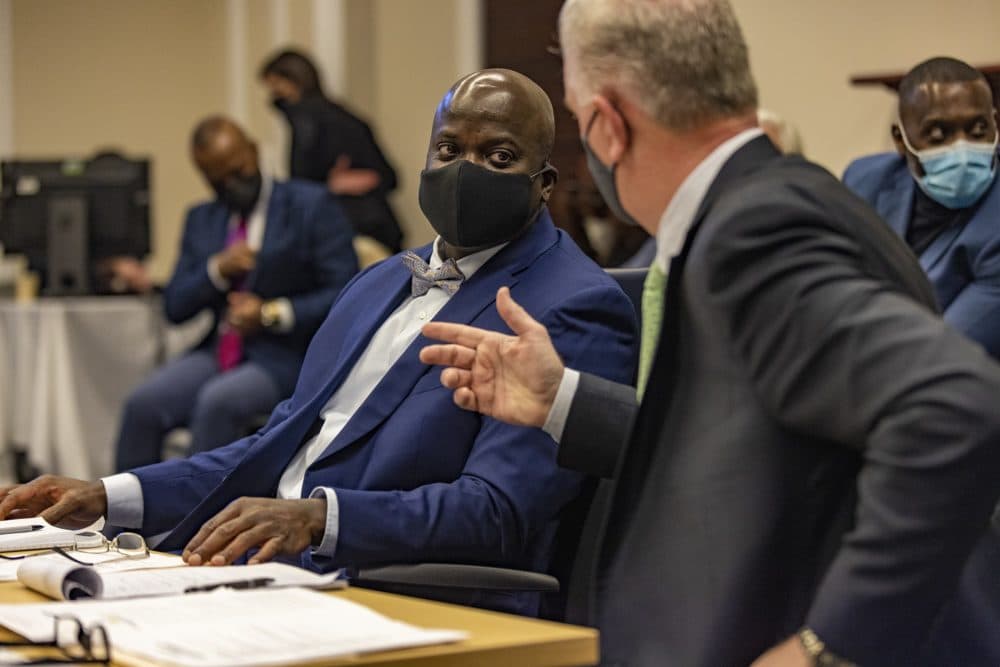Advertisement
Governor's Council weighs commutation of first-degree murder life sentence

Members of the Governor's Council spent more than nine hours Wednesday considering whether to commute a man's life in prison sentence for first-degree murder.
Earlier this month Gov. Charlie Baker recommended commuting the sentence of Thomas Koonce, who has been in prison since 1992 for the fatal shooting of 24-year-old Mark Santos. The recommendation — the first of its kind in more than two decades — calls for commuting Koonce's sentence from first-degree to second-degree murder, which would make him eligible for parole.
Appearing before the council in a suit jacket and bow tie, Koonce said he takes responsibility for killing Santos and if released, would spend his life giving back to the community to try to make amends.
“I’m not the same 20 year old that pulled the trigger and made some very bad decisions that night," now 54-year-old Koonce said.
Several people testified on Koonce's behalf Wednesday, including the district attorney's office that prosecuted him.
Bristol County District Attorney Thomas Quinn, who was not DA at the time of prosecution, said Koonce has taken responsibility for the crime and has had an exemplary record during his 30 years in prison, receiving a bachelor's degree from Boston University and helping establish a restorative justice program at MCI-Norfolk prison.
"He understands the gravity of his actions," Quinn said. "Commuting his sentence does not minimize his actions, which are very serious, but acknowledges his extraordinary efforts to reform his life."
The assistant district attorney who prosecuted the case, John Moses, who is now deceased, testified at a 2010 commutation hearing that he was concerned the evidence did not support Koonce's first-degree murder conviction.
Council member Terrence Kennedy asked Quinn if Koonce was penalized for taking his case to trial, rather than accepting prosecutors' offer to plead guilty to manslaughter with a likely 5-to-10-year prison sentence.
"The only difference between that offer and him spending the next 30 years in prison was that [Koonce] exercised his constitutional right to go to trial," Kennedy said to Quinn. "Should he have spent another 20 years in jail for simply going to trial?"
Quinn said there is a lot of negotiating in criminal cases and that's typical of how the court process works. He also pointed out that Koonce's appeals were reviewed by higher courts and denied.
In July 1987, when Koonce was 20, he was on a two-week leave from the Marine Corps and visiting his home in Brockton. While out with friends, Koonce said they came across an angry mob beating people and smashing cars with bats. He said he fired a single shot from his legally held gun to scare off the crowd, and that shot hit Santos in the chest.
Koonce maintained that he did not shoot into the crowd, but pointed his gun out a moving car window and fired because he feared for his life. But several council members pressed Koonce as to why he was carrying a gun and why he fired it recklessly.
Council member Robert Jubinville pointed to discrepancies between Koonce's testimony and that of other witnesses to the crime. Although Jubinville said he generally does not support life-in-prison sentences, he found Koonce's recollections weren't credible, but he would consider it before the council votes next month.
"The facts that you're disputing don't mean a damn thing to me," Jubinville said to Koonce. "Whether you pointed [the gun] at somebody or not doesn't matter to me at this point. I want to find a way to vote for you."
Koonce went to police after he found out someone was shot. He was released and continued to serve in the Marines. His first trial ended with a hung jury, but he was convicted in 1992.
Also testifying in support of Koonce was his son, Thomas Andrews, who was born shortly before Koonce went to prison. Andrews said his father has influenced his life and taught him to help others and consider his actions.
"I have tried to make sense of all this for years," Andrews said. "I had to do a lot of work internally. My father wasn't there physically for me but I was always in touch with him and there isn't a day that goes by that I don't think about the importance of all of the decisions I make."
The only opposition to commutation came in a letter the Santos family wrote to Baker, asking that Koonce remain in prison. Council member Christopher Iannella read the letter during Wednesday's hearing.
"We have experienced unbearable grief, pain, anger and suffering," Iannella read. "The heartache never ends and when we seem to be making strides, Koonce brings us back to July 21, 1987."
Baker has also recommended the commutation of another prisoner, William Allen, who was convicted for taking part in a fatal robbery in 1994. These are the first clemency petitions approved by Baker since he took office in 2015.
The Governor’s Council has scheduled William Allen's hearing for next week. The council will vote on both commutation requests on Feb. 16. After that, the parole board, which recommended commutation to the governor, will review the petitions and determine what conditions would have to be met for the men to be released.
